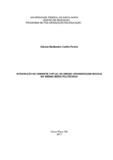| dc.creator | Pereira, Glaucia Medianeira Coelho | |
| dc.date.accessioned | 2018-07-31T19:21:12Z | |
| dc.date.available | 2018-07-31T19:21:12Z | |
| dc.date.issued | 2017-08-21 | |
| dc.identifier.uri | http://repositorio.ufsm.br/handle/1/13966 | |
| dc.description.abstract | It is known that Moodle is free software, and research and study has been approaching it as mediator of school practices, including as educational technology that enables interaction, interactivity and collaboration are already well established. This research arose from concerns about the observation that high school teachers did not integrate Moodle into their pedagogical practices. Given this, the objective of the work was to investigate the potentialities of Moodle as mediator of didactic activities in high school. The methodology was the Research-Action-school (IAE), with the research begun in the first half of 2016 and ending in the first half of 2017. The subjects were the five teachers and 34 students, Polytechnic College of the Federal University of Santa Maria, UFSM. The actions were implemented through micro-offices, where the potentialities of Moodle were explored. Among the results, it was verified that none of the teachers used the Moodle, but all considered relevant the digital inclusion in the school context. As for students, everyone has access to the internet, and they would like teachers to use Moodle. Thus, the relevance of this work in the school context of these teachers and students was perceived, since the subjects were awakened about the potentialities, when exploring the resources and collaborative activities available in Moodle. Thus, the objectives were reached, because the work fostered changes in the practices of some teachers, since they began to integrate Moodle in their didactic activities, as well as realized that this could be a mediator in the teaching-learning process. Therefore, such practices require continuity, that is, subjects should continue to use Moodle in order for it to become a praxis of everyday school life. | eng |
| dc.description.sponsorship | Coordenação de Aperfeiçoamento de Pessoal de Nível Superior - CAPES | por |
| dc.language | por | por |
| dc.publisher | Universidade Federal de Santa Maria | por |
| dc.rights | Attribution-NonCommercial-NoDerivatives 4.0 International | * |
| dc.rights.uri | http://creativecommons.org/licenses/by-nc-nd/4.0/ | * |
| dc.subject | Ensino-aprendizagem | por |
| dc.subject | Investigação-ação escolar | por |
| dc.subject | Moodle | por |
| dc.subject | Tecnologias educacionais em rede | por |
| dc.subject | Teaching-learning | eng |
| dc.subject | Research-action-school | eng |
| dc.subject | Moodle | eng |
| dc.subject | Networked educational technologies | eng |
| dc.title | Integração do ambiente virtual de ensino-aprendizagem moodle no ensino médio politécnico | por |
| dc.title.alternative | Integration of the virtual environment of moodle teaching-learning in middle polytechnic teaching | eng |
| dc.type | Dissertação | por |
| dc.description.resumo | Sabe-se que o Moodle é um software livre, e as pesquisas e estudo vem abordando-o como mediador das práticas escolares, inclusive como tecnologia educacional que possibilita a interação, interatividade e colaboração já estão bem consolidados. Essa pesquisa surgiu de inquietações frente à observação de que professores do ensino médio não integravam o Moodle em suas práticas pedagógicas. Visto isso, o trabalho teve por objetivo investigar as potencialidades do Moodle como mediador das atividades didáticas no ensino médio. A metodologia foi a Investigação-ação-escolar (IAE), tendo a pesquisa iniciado no primeiro semestre de 2016 e término no primeiro semestre de 2017. Os sujeitos participantes foram os cinco professores e 34 estudantes, do ensino médio do Colégio Politécnico da Universidade Federal de Santa Maria, UFSM. As ações foram implementadas através de microoficinas, onde foram exploradas as potencialidades do Moodle. Dentre os resultados, constatou-se que nenhum dos professores utilizavam o Moodle, mas todos consideraram relevante a inclusão digital no contexto escolar. Quanto aos estudantes, todos possuem acesso à internet, bem como gostariam que os professores utilizassem o Moodle. Sendo assim, percebeu-se a relevância desse trabalho no contexto escolar desses professores e estudantes, haja vista que os sujeitos foram despertados acerca das potencialidades, ao explorarem os recursos e atividades colaborativas disponíveis no Moodle. Dessa forma, os objetivos foram alcançados, pois o trabalho fomentou mudanças nas práticas de alguns professores, haja vista terem começado a integrar o Moodle em suas atividades didáticas, bem como perceberam que esse poderia ser um mediador no processo ensino-aprendizagem. Por conseguinte, tais práticas requerem uma continuidade, ou seja, os sujeitos devem seguir utilizando o Moodle a fim de que isso se torne práxis do cotidiano escolar. | por |
| dc.contributor.advisor1 | Abegg, Ilse | |
| dc.contributor.advisor1Lattes | http://lattes.cnpq.br/5450252602273986 | por |
| dc.contributor.referee1 | Leonel, André Ary | |
| dc.contributor.referee1Lattes | http://lattes.cnpq.br/6703447252635796 | por |
| dc.contributor.referee2 | Bulegon, Ana Marli | |
| dc.contributor.referee2Lattes | http://lattes.cnpq.br/1315096515847809 | por |
| dc.creator.Lattes | http://lattes.cnpq.br/7062774011784240 | por |
| dc.publisher.country | Brasil | por |
| dc.publisher.department | Educação | por |
| dc.publisher.initials | UFSM | por |
| dc.publisher.program | Programa de Pós-Graduação em Educação | por |
| dc.subject.cnpq | CNPQ::CIENCIAS HUMANAS::EDUCACAO | por |
| dc.publisher.unidade | Centro de Educação | por |



